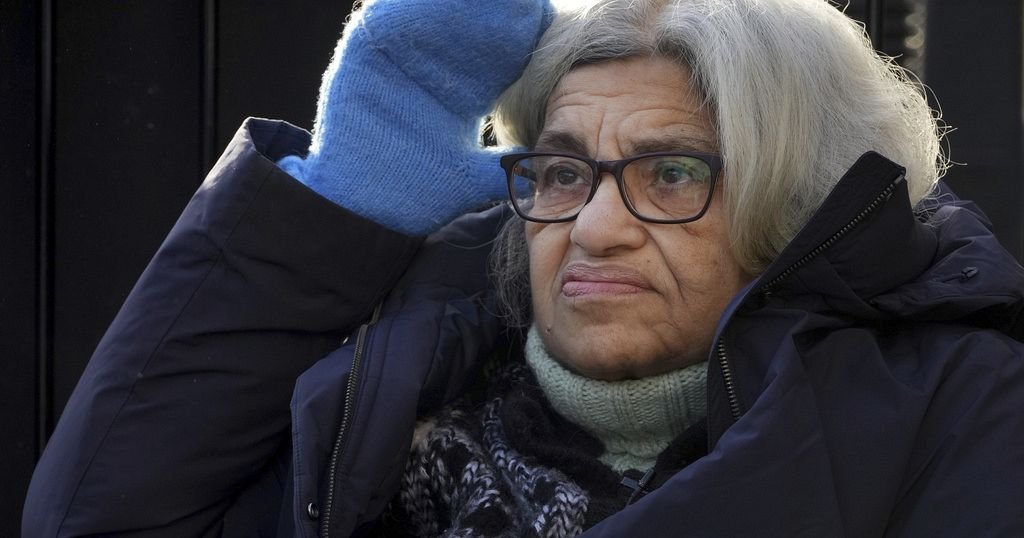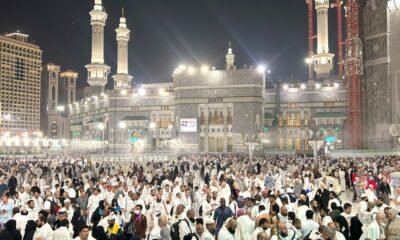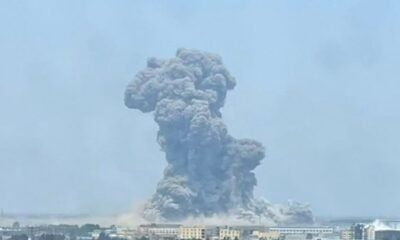Africa
Sierra Leone debates decriminalizing abortion

A simple bench and makeshift nurse’s station have transformed an abandoned building into a temporary clinic in rural Njagbahun, Sierra Leone.
Marie Stopes International operates free family planning services to those in hard-to-reach areas.
Working by the light filtering through a curtained doorway, nurses provide “post-abortion care” and distribute contraception.
Mariama Soriba, 25, peeled off from the local market, in need of the birth control implant.
“I’ve come for the family planning service so I can space out my children,” she said.
Women’s reproductive rights are up to be widely expanded in Sierra Leone as lawmakers debate the Safe Motherhood Bill, which would legalize abortion and give wider access to family planning and reproductive health services.
Government officials have called the bill a necessary response to the reality of high numbers of deaths among pregnant women, particularly from botched abortions.
When she got pregnant at 16, Fatou Esther Jusu was terrified that it would derail her future.
Fearing judgment from her family, she took friends’ advice and bought misoprostol, a drug whose uses include abortion, from a local pharmacy.
It didn’t work. Desperate, she tried again and miscarried.
Over 20% of girls between 15 and 19 in Sierra Leone get pregnant, according to the U.N. Population Fund, one of the highest teenage pregnancy rates in the world.
Now 21, Jusu considers herself lucky.
One friend died after taking an expired version of the medication.
With those experiences in mind, the nursing student is mobilizing others in support of the bill that would decriminalize abortion in the West African country.
“This gave me the cause to focus my education, my activism on SRH (sexual reproductive health) issues because I have been a victim, I don’t want other girls to be a victim of it,” Jusu said.
The country could become the second nation in West Africa to decriminalize abortion, which health workers say would significantly improve the safety of pregnant women, decrease the number of preventable deaths and bring an end to the current colonial-era law.
Tens of thousands of women and girls attempt to self-terminate their pregnancies every year in Sierra Leone, where abortion is illegal in all circumstances.
Supporters of the bill say unsafe abortions account for around 10% of maternal deaths. Healthcare workers are known to perform terminating procedures when the situation is “incompatible with life” of the woman, usually in the case of “incomplete” abortions. Because abortion is illegal, they cite other reasons for the termination.
Sierra Leone’s President Julius Maada Bio pointedly introduced the Safe Motherhood Bill after the U.S. Supreme Court overturned Roe v. Wade in 2022, stripping away women’s constitutional protections for abortion.
If approved, the bill would have been West Africa’s most progressive legislation on abortion, allowing the procedure for up to 14 weeks.
But Sierra Leone since then has been torn apart by debate.
Following opposition from religious leaders, the bill has been amended and now limits abortion to cases of life-threatening risk, fatal foetal abnormalities, rape or incest.
An estimated 90,000 abortions are performed annually in Sierra Leone, a country of more than 8 million people, according to research by the African Population and Health Research Center.
About 10% of the country’s maternal deaths — affecting 717 of every 100,000 births — are due to unsafe abortions, the center said.
Health workers say the true number is likely much higher.
Due to cost and stigma, many women and girls resort to unsafe methods like expired medication, laundry detergent, hangers or sharp instruments.
On a recent morning at a clinic run by the MSI Sierra Leone nonprofit, dozens of women and girls waited nervously for consultations with nurse Hawanatu Samura.
MSI offers “post-abortion care,” including in cases of “incomplete” miscarriage, often when people have tried and failed abortions themselves.
The nonprofit is the largest individual service provider of family planning services in the country.
If patients want an abortion, “you cannot stop them,” Samura said.
She often sees damage caused by unsterilized instruments, leading to severe hemorrhages, especially in underage girls.
The government says it expects a vote in parliament on the bill in the coming weeks.
It is not clear whether it will be approved.
Africa
DR Congo Justice Minister under fire over $19M transfer

In the Democratic Republic of Congo, pressure is mounting on Justice Minister Constant Mutamba after explosive allegations over a multi-million dollar no-bid contract and suspicious fund transfers.
On Tuesday, lawmakers grilled the Attorney General for six hours and Mutamba for five. The focus: a $29 million deal awarded without competition, and a $19 million payment to Zion Construction—wired just one day after the company opened its bank account.
The funds didn’t come from the state treasury, but from FRIVAO, the agency managing $325 million in war reparations from Uganda. That agency falls under Mutamba’s direct authority. Defending himself, the minister admitted to “errors” and asked for forgiveness—but claimed he’s the target of political revenge.
He also blamed tensions with Prime Minister Judith Suminwa for a toxic work climate. Lawmakers say the accusations are serious, and the judiciary must be allowed to act. Mutamba’s future in government now hangs in the balance.
Africa
U.K-Egypt: Mother of jailed activist hospitalised amid hunger strike

The mother of a pro-democracy activist imprisoned in Egypt is seriously ill in a London hospital after resuming a hunger strike aimed at pressing for her son’s release, her family said Friday. Laila Soueif was admitted to St Thomas’s Hospital on Thursday night with dangerously low blood sugar levels. “The bottom line is, we’re losing her,” her daughter, Sanaa Souief, said outside the hospital. She added: “(Prime Minister) Keir Starmer needs to act now. Not tomorrow, not Monday, now, right now.”
Laila Soueif has been on hunger strike since September 29 to protest the imprisonment of Alaa Abdel-Fattah, a British-Egyptian dual national who has been in prison in Egypt since September 2019. He was sentenced in December 2021 to five years in prison for spreading false news and should have been released last year, but Egyptian authorities refused to count the more than two years he had spent in pre-trial detention and ordered him held until January 2027.
Laila Souief spent weeks camped outside Britain’s Foreign Office and the prime minister’s Downing Street office to highlight her son’s case. She was previously admitted to hospital in February, with doctors warning she was at “high risk of sudden death.” She agreed in early March to move to a partial hunger strike after Starmer pledged to press Egypt to release her son. She resumed her full hunger strike on May 20, saying: “Nothing has changed, nothing is happening.”
The family says Souief has lost 42% of her bodyweight during the 242-day hunger strike. They say she has received glucagon treatment, which induces the liver to break down stored fat to obtain glucose, but continues to refuse glucose, which would provide her with calories. Abdel-Fattah has been on his own hunger strike for 90 days following his mother’s admission to hospital in February. Thousands of critics of Egyptian President Abdel Fattah el-Sissi have been locked up under dire conditions after unjust trials, human rights groups say.
The British government said that Starmer raised Abdel-Fattah’s case in a call with the Egyptian president last week, and Middle East Minister Hamish Falconer discussed it with Egypt’s Foreign Minister Badr Abdelatty on Sunday. “We are concerned to hear of Laila’s hospitalization. We remain in regular contact with Laila and her family and have checked on her welfare,” the Foreign Office said in a statement. “We are committed to securing Alaa Abdel-Fattah’s release and continue to press for this at the highest levels of the Egyptian government.”
Africa
Deadly floods sweep Nigeria | Africanews

Torrents of predawn rain unleashed flooding that killed at least 150 people in a market town where northern Nigerian farmers sell their wares to traders from the south, officials said Friday as they predicted that the death toll would grow. The Nigerian Hydrological Services Agency did not immediately say how much rain fell after midnight Thursday in the town of Mokwa, which sits in the state of Niger more than 180 miles (300 kilometers) west of Abuja, capital of Africa’s most populous nation. Communities in northern Nigeria have been experiencing prolonged dry spells worsened by climate change and excessive rainfall that leads to severe flooding during the brief wet season. In videos and photos on social media, floodwaters covered neighborhoods and homes were submerged, with their roofs barely visible above the brown currents. Waist-deep in water, residents tried to salvage what they could, or rescue others. Mokwa, nearly 380 kilometers (236 miles) west of Abuja, is a major meeting point where traders from the south buy beans, onions and other food from farmers in the north. A community leader from the Mokwa local government Area, Alhaji Aliki Musa, says this type of flood is seasonal and its not ordinary. “The water is like spiritual water which used to come but it’s seasonal…there’s not much water in Mokwa that will bring that flood,” he said. In September, torrential rains and a dam collapse in the northeastern city of Maiduguri caused severe flooding that left at least 30 people dead and displaced millions, worsening the humanitarian crisis caused by the Boko Haram, a self-proclaimed jihadist militant group based in northeastern Nigeria.
-

 Africa4 days ago
Africa4 days agoSurvivor of Liverpool car ramming talks of shock and panic
-

 Sports3 days ago
Sports3 days agoThe Knicks are bringing hope and title dreams back to New York after years in the doldrums
-

 Lifestyle3 days ago
Lifestyle3 days agoChildren and careers: Talking to kids about what they want to be when they grow up
-

 Lifestyle4 days ago
Lifestyle4 days agoHow to decorate a patio, balcony or other small outdoor space
-

 Lifestyle3 days ago
Lifestyle3 days agoFaizan Zaki hopes to go from spelling bee runner-up to champ
-

 Middle East4 days ago
Middle East4 days agoHajj pilgrimage in Saudi Arabia to begin on June 4 | Religion News
-

 Asia5 days ago
Asia5 days agoHuge blast rocks Chinese chemical plant, authorities launch rescue operation
-

 Europe5 days ago
Europe5 days agoMacron’s marital shove disappears from French airwaves




